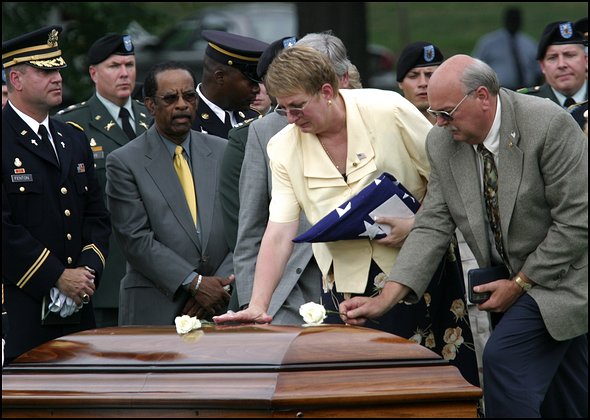Why do we mourn strangers
In the city of Tracy in California a few days ago, thousands of people gathered in a memorial for an 8-year-old girl Sandra Cantu who was abducted on March 27. Police and volunteers searched the neighborhood to find clues, while the information that psychicists put forward and contradictively does not help.
Ten days later, Cantu was found by farm workers as they drained the water from an irrigation pond near her home. Before that, I was raped, killed and stuffed into a suitcase. Melissa Huckaby, a local church catechism teacher, was arrested on charges of rape and murder.
Many people, though unfamiliar with sending gifts, poems, and prayers to the Cantu family from all over the world. They held a prayer meeting and set up memorial pages on the Internet. Tracy City Police Chief, Janet Thiessen said in his remembrance that 'Sandra Cantu has become the little girl of all of us, my soul touches all souls.'
So touched! But of course, very few of these thousands of people have ever known, or have simply met me: for them I am just a smiling face on the item of missing people or on articles.
So what makes those unfamiliar people shed tears for a stranger?
Eventful grief
Most answers are found in psychology: When tragedy happens - whether it's a big storm or a missing baby - unfriendly people often gather to comfort each other. Some of these are parents who have suffered loss in their families, the others simply want to say condolences to people in distress.
For many of these, it turned out to be more useful for themselves to the victim's family.

Why do we mourn strangers (Photo: op-for.com)
In society often in our closed state, gather together to regret a stranger to help people feel connected to others, to be part of a larger whole. This is most evident when Princess Diana died in 1997 and the public showed the deepest collective sorrow ever seen in history before a person's death.Tens of thousands of people wrote letters to princess and pilgrims to her house in London. Millions of people all over the world follow the funeral and TV shows commemorating the 'Princess of the People' in the following weeks.
'Newsweek' journalist Ken Auchincloss calls this ' eventful mourning ', in which ' the emotion is the cohesion of people with an event that the television, the media keeps talking about. This emotion is a form of immersion with the community rather than a personal emotion. Just like when you scream at a pop performance, when you don't necessarily love or admire the performer, you may simply be completely immersed in the overall atmosphere of the show. '
Perfect face
There is another reason why people all over the world follow the story of Sandra Cantu recently: I am the perfect face for the media to report, thereby attracting the public's wide attention. them .
In order for people to be touched or sorry for an incident or a missing case, people must first know about the case. It is clear that not all missing people receive the same attention and sympathy from the media.
Sandra Cantu is a case for the media: a white baby, young, cute like a flower bud, and a girl.
Missing girls always get more attention than boys, boys get more attention than adults or teenagers. Cases of missing white children will be reported by the media more than black cases. There must be a reason why names like JonBenet Ramey, Caylee Anthony, Madeleine McCann, and Sandra Cantu are very well known - not simply because they are kidnapped white girls. killing.
The reasons why we mourn strangers are very different and private, the only thing that is certain: that regret is a great comfort for families who lose loved ones.
- More fun by talking to strangers
- The civet bears more strangers than its neighbors
- 36 questions will make you love anyone when you first meet
- The truth behind the similar appearance of casting of three strangers
- Prevent strangers from arbitrarily turning off your computer
- Tribal mystery isolates itself from the world by ... killing strangers
- The story of the elephant's compassion
- Spain: Lost stolen 94 rare turtles
- New Zealand commemorates the star sheep
- Luwig Boltzmann - Physics, Music, Philosophy and Death
- Trees recognize relatives
- To Ma Lat: The only female bow who is respected by the royal family, dies and has an emperor to mourn
 'Fine laughs' - Scary and painful torture in ancient times
'Fine laughs' - Scary and painful torture in ancient times The sequence of numbers 142857 of the Egyptian pyramids is known as the strangest number in the world - Why?
The sequence of numbers 142857 of the Egyptian pyramids is known as the strangest number in the world - Why? History of the iron
History of the iron What is alum?
What is alum?